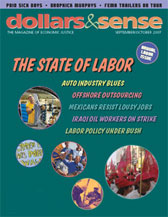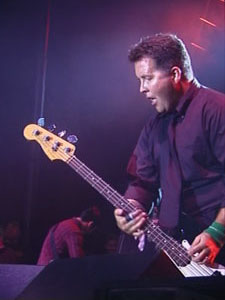In Review
Dropkick Murphys: Friends to the Working Class
This article is from the September/October 2007 issue of Dollars & Sense: The Magazine of Economic Justice available at http://www.dollarsandsense.org

This article is from the September/October 2007 issue of Dollars & Sense magazine.
Subscribe Now
at a 30% discount.
Smart. Aggressive. In your face. Committed to economic justice. These words describe an effective union organizer; they also describe the no-nonsense punk rock band Dropkick Murphys, a true friend of organized labor. The band's annual St. Patrick's Day partnership with Local 103 of the International Brotherhood of Electrical Workers (IBEW) combines breakfast, beer, and bagpipes into an innovative example of how labor and the arts can work together to benefit the local community, while building their respective images. So, who are the Dropkick Murphys, what is their connection to organized labor, and why should unions looking for new tactics in the battle for hearts and minds be turning up their speakers?
The Worker's Song
This one's for the workers who toil night and day
By hand and by brain to earn your pay
For centuries long past for no more than your bread
Have bled for your countries and counted your dead.
For his Oscar-winning 2006 film The Departed, director Martin Scorsese decided that the gritty, blue-collar toughness of the Dropkick Murphys was the right match for the street-smart acting of Leo DiCaprio, Jack Nicholson, and Boston natives Mark Wahlberg and Matt Damon. As a result, the Murphys' "Shipping Up to Boston" (with lyrics by Woody Guthrie) provides the musical lead for nearly every pivotal scene.
Haven't seen The Departed? Perhaps you caught a Boston Red Sox game during the 2004 World Series season. If so,chances are you heard the Murphys' "Tessie," a cover of an early 20th-century Broadway tune. The song's original recording had been the theme for the world champion 1903 Red Sox team, and the Murphys' remake became the anthem of the "miracle" 2004 season.

Ken Casey at the Irish Connections Festival (ICONS 2007). Photo credit: Paul Piwko.
The Murphys started in Boston in the mid-90s as a band of young men from working class and union households. Says vocalist and bassist Ken Casey, a founding member: "We were singing about real life stuff at a time when [the] standard 18 year-old punk rock message [was] 'F- authority' and 'F- the police'." The Murphys' "real life" lyrics hit home with fans from backgrounds similar to their own. "People from that walk of life started to gravitate towards the band, and in the early days—back in the mid-'90s—places like Detroit, where labor issues are real life and death stuff, were our biggest footholds."
In 2001, the AFL-CIO asked the Murphys to perform for its Labor Day festival. Casey humbly recalls his disbelief: "Wow! For a punk band that started out playing at the Rat in Boston to be playing at the AFL-CIO headquarters with President Sweeney introducing you is a pretty wild progression."
As the Murphys' fan base has grown, so has their ability to influence a broader group of people. Perhaps coincidentally, just as economic insecurity has crept from blue collar into white collar demographics, the Murphys now draw a similarly more diverse crowd. Fans include parents and teens from every class. The band is reaching an age group that labor unions very much need to reach. "A lot of these kids would have never been confronted by [labor struggles], but you have a kid that maybe is from an affluent family,and really it's not a life or death struggle for him, but … he sees what's right and wrong and maybe from a political standpoint says, 'Wow, this is something I want to be involved in.'"
In the factories and mills, in the shipyards and mines
We've often been told to keep up with the times
For our skills are not needed, they've streamlined the job
And with slide rule and stopwatch, our pride they have robbed
We asked Casey about the Murphys' relationship with IBEW. "It was very much a symbolic partnership. In many instances throughout the band's career— whether it's getting involved in the middle of disputes in different cities between stagehand locals and venue ownership, sometimes canceling shows—we work hand-in-hand [with unions] in a lot of situations." This year's St. Patrick's Day concert and charity fundraiser included a marketing partner: the largest rock and roll radio station in the Boston area, whose disc jockeys promoted the event frequently in the days leading up to the event, and who broadcast the concert live.
Mike Monahan, the business manager from IBEW Local 103, was there with his nine-year old daughter, Hanna. Monahan is careful to point out that the primary purpose of the event was to benefit a local charity, but he also recognizes that "anytime that you can get on radio … anytime we heard 'Local 103, Local 103, Local 103,' that's all good."
One outcome of the decline in union membership over the last half century is that the image and perceived relevance of unions has weakened. Monahan, who helped make the charity event possible, told us, "I think most people paint all unions with one very wide brush—one that is mainly older and male." He hopes that pairing up with the Murphys and their younger fan base could help to alter the stereotype. "It aligned us with a band that typically wouldn't align with us, so I think I was hoping that this group of people would change their view of union members." Reflecting on the band's relationship with the AFL-CIO, Casey made a similar observation. "The AFL-CIO wanted to get involved with us because President Sweeney's not showing up on street corners to talk to 15 year old kids and getting anywhere, you know what I mean?"
We're the first ones to starve,
we're the first ones to die
We're the first ones in line for that pie in the sky
And we're always the last when the cream is shared out
For the worker is working when the fat cat's about
Today, unions expend significant resources on "situational marketing"—the kind that is required to motivate X% of the workers at Employer Y to organize with Union Z. These workplace campaigns will likely always be a primary use of union resources, but on this playing field, management enjoys obvious legal and regulatory advantages. Seeing the Dropkick Murphys in action makes us wonder whether unions wouldn't find it easier to organize at the workplace level if the skids were greased in advance by effective image making? What if the image of a union member could be recast in the minds of future generations? Imagine if Mike Monahan's hope came true: if the simplistic stereotypes offered by Hollywood and the corporate media were replaced, and the popular image of union members came to be widely seen as "people like me." Wouldn't this plant the seeds for future growth in organized labor?
So, how would such a wholesale change in image be initiated? The band's union partnerships remind us that one method of making a brand relevant to a target audience is to associate it with other products already consumed by that audience. This is the marketing formula at work (in a contrived and disingenuous form) when Pepsi connects itself with Ludacris to woo the hip-hop market, or when candidate Bush appears at the Daytona 500 wearing a NASCAR jacket. Yet such cross-promotions sometimes hit the bull's-eye, and the Murphys' alliance with the IBEW raises the question of how other unions might create their own authentic, grassroots version of this formula to introduce themselves to new audiences.
The world's problems, or even those of organized labor, will not be solved by breakfast, beer, and bagpipes alone, but on the morning of St. Patrick's Day, while much of Boston lay sleeping, members of IBEW Local 103 and the Dropkick Murphys were hard at work raising thousands of dollars for the charity My Brother's Keeper. The worker was working and the fat cats missed out.
The Meanest of Times, the Dropkick Murphys' latest release, will hit store shelves this September. Says Casey, "It seems like more and more now it's either you're rich or you're struggling and I don't know if that's a reversible thing or just the nature of a changing world—I don't know. One of the songs on our new album—it's called 'Tomorrow's Industry'— is basically about a person's fight between what used to work and what doesn't now." As opposed to their last album, which Casey explains was "kind of a reaction to the fact that we just had a lot of death around us," this album turned out to be sort of a rebound from that, sending the message that "you gotta really cherish what you have and who's in your life." The new album also reflects Casey's optimistic outlook on the current state of the working class. "I guess it's easier for me to have hope and it's easier to spread hope," he laughs. "What are the alternatives, ya know?"
